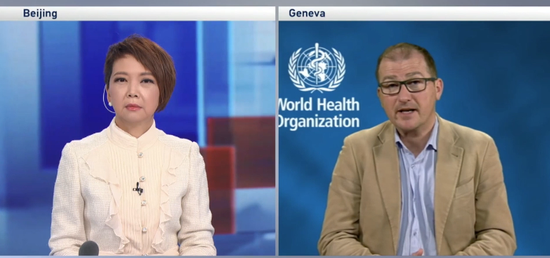
All eyes are set on China's fight against the coronavirus, or COVID-19, as the WHO named it on Tuesday. Since the outbreak, more than 44,000 cases have been confirmed in China; Over 1,000 people died from the virus; new confirmed cases have been found in dozens of countries in two months. How long will this fight last? What should be done to control and eventually conquer the virus? How to evaluate the performances of the medical workers on the frontline? CGTN's Senior Correspondent Tian Wei talked with WHO spokesperson Tarik Jasarevic on these issues. Although Chinese scholar Zhong Nanshan suggested earlier that there is likely to be a wrap-up of the outbreak by April, Jasarevic believed that it is hard to predict how this outbreak can go at the current stage. "We have seen in the past with other diseases that epidemiological curve can go up and down," the spokesperson said, but emphasized that "what is really important is to work altogether to put in place measures." At present, China and the international community are working closely in analyzing the genetic data of the virus. But this, for Jasarevic, is far from enough. "What we expect is to have a clear roadmap on what needs to be done, and it's not only about genetic sequencing or sharing the material." He attached great importance to an overall scientific study on the virus, including the transmissibility, sources, treatments, and the vaccine of the virus. "We can really collectively profit from the scientific work that is being done," Jasarevic emphasized. Apart from scientific inputs, Jasarevic stressed that "the bigger part of the solution is how we behave and how we equip our health system," adding that whatever the pathogen is, strong health systems can allow countries to quickly detect and respond to the outbreak. "If we equip our health systems around the world with necessary technology, equipment, and supplies, if we train health workforce, we will be able to reduce the number of cases by reducing the risk of exposure and transmission." However, not every country has this core capacity. This, according to Jasarevic, is why the WHO declared global health emergency on COVID-19. The virus' spreading to countries with weak health systems is one of the biggest fears at the current stage, Jasarevic said. Despite the declaration of the global health emergency, Jasarevic praised Chinese medical workers' efforts in the fight against the virus. "We really appreciate the work that has been done by health workers in Wuhan… In affected areas, they are protecting not only people of Wuhan, but they are also protecting the world safe," Jasarevic said. He emphasized that people should always be grateful to the heroic work by medical workers on the frontline, "because they are putting their lives in danger to protect [not only] patients, but also all of us." China, as Jasarevic claimed, has already established developed health system in the past years. Therefore, one of WHO's priorities at the current stage is to help China in the scientific researches. Still, the fight against the COVID-19 is a global issue. In his interview with CGTN, Jasarevic reiterated the necessity and importance of global coordination against the virus. "We want solutions to be taken on a global level," Jasarevic said. World Insight with Tian Wei |
Powered by Discuz! X3.4 Licensed
© 2001-2013 Comsenz Inc.